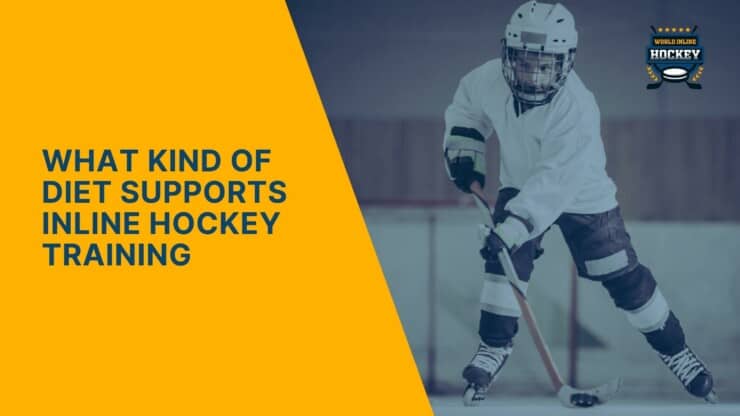What kind of diet supports inline hockey training?
Many athletes find themselves perplexed by this question.
The truth is, it’s not just about the sweat and tears on the rink – your nutrition plays an equally important role in enhancing performance.
What kind of diet supports inline hockey training isn’t rocket science but it does require some knowledge and planning.
But here’s the kicker… If you don’t understand how to fuel your body properly for this high-intensity sport, you’ll never reach peak potential.
The Daily Grind in Inline Hockey Training
Inline hockey is a demanding sport.
Hockey players must be prepared to exert intense bursts of energy, as hockey requires anaerobic efforts.
This makes training an essential part of any player’s routine.
That sports nutrition improves performance significantly. And Inline hockey performance heavily relies on a well-rounded diet.
Adequate Sleep and Nutrition: The Pillars of Performance
Sleep is essential for recuperation after vigorous physical activity.
That sleep deprivation can negatively impact athletic performance.
Nutrition also heavily influences how well athletes perform on the rink.
A diet rich in carbohydrates, proteins, and healthy fats provides fuel for both practice sessions and actual games.
What kind of diet supports inline hockey training?
Dietary Strategies for Optimal Performance:
It’s not just about what you eat; it’s also when you eat it. Nutrient timing has been shown to enhance exercise output by ensuring nutrients are available during periods of increased metabolic demand.
As such, planning meals around your training schedule becomes critical if optimal performance is desired.
In our next section titled “Nutrient Timing for Optimal Performance”, we will delve deeper into this topic providing practical strategies inline hockey players can adopt to maximize their potential on the rink.
Nutrient Timing for Optimal Performance
When it comes to inline hockey, understanding nutrient timing is crucial.
This approach involves strategically planning when you consume specific nutrients to enhance your physical activity and performance on the rink.
The Importance of Nutrient Timing in Inline Hockey
In a sport like hockey where anaerobic efforts are frequent, optimizing nutrition can significantly improve performance.
Research has demonstrated that exercise heightens insulin sensitivity, a vital factor in the transfer of glucose into our cells.
A Higher Insulin Environment: A Key To Better Performance?
An intriguing aspect of sports nutrition revolves around creating a higher insulin environment – but why?
Studies have found that this condition promotes better muscle protein synthesis leading to optimal anaerobic performance ability.
Carbohydrates – Timing is Key
When preparing for tournament day nutritional timing strategies, carbohydrates take center stage.
The reason lies within their function as they serve as the primary energy source during high-intensity workouts or games.
Consuming liquid carbohydrate sources such as sports drinks helps replenish glycogen stores quickly improving overall game-day stamina.
Protein – The Long-Term Fuel
In contrast with carbs’ immediate effect, protein’s impact spans over time contributing substantially towards long-term potential gains.
This macronutrient supports muscle growth and recovery post-training sessions making them integral components of any athlete’s diet.
With these insights at hand, young athletes can now prepare more effectively leveraging proper nutrient timing strategies alongside regular training load ensuring peak-performance come matchday.
Preparing for Tournament Day Nutrition
The nutritional approach on the actual tournament day can significantly influence a hockey player’s performance.
Understanding what an average tournament go’er eats and how to prepare nutrient timing strategies is crucial.
Pre-Game Meal Composition
A well-planned pre-game meal aims at achieving desired body composition result while ensuring enough energy for the game.
The focus should be on carbohydrates, proteins, and vegetables in specific proportions.
About 50% of your plate should consist of complex carbohydrates like whole grains or sweet potatoes that provide sustained energy throughout the match.
These are essential as exercise increases insulin sensitivity, creating a higher insulin environment which supports optimal anaerobic performance ability.
In addition to carbs, approximately 25% of your meal should include lean protein sources such as chicken breast or New Zealand Whey Protein Isolate.
Protein powders support muscle growth and recovery post-match.
Lastly but importantly – don’t forget about veggies. They make up another quarter (approximately) of this balanced pre-game dish.
Remember: you want to consume this meal around two hours before hitting the rink.
Snacks Before Game Time
If hunger strikes again right before it’s time to lace up those skates – fear not.
A few quick-digesting snacks might just do trick here without weighing you down during playtime.
For instance consider grabbing handfuls from peanut butter jars; munching some fresh fruits like bananas apples oranges etc.; nibbling nuts, almonds, walnuts, cashews so forth- these options all offer great balance between nutrients needed fuel muscles effectively through intense physical activity involved inline hockey matches.
As we move forward with our nutrition guide remember that maintaining proper hydration plays key role overall health wellbeing athletes too.
Stay tuned next section where delve deeper into importance drinking plenty fluids along implementing effective recovery strategy after each game.
Hydration and Recovery Nutrition Strategies
In the world of inline hockey, hydration plays a crucial role. Studies show that even mild dehydration can negatively impact performance.
The Importance of Hydrating with Sports Drinks
Sports drinks are suggested for young athletes because of their capacity to quickly restore electrolytes that have been depleted during exercise.
They contain carbohydrates which provide immediate energy, aiding in optimal anaerobic performance ability.
A well-formulated sports drink is more than just water; it’s engineered nutrition designed specifically for athletic needs.
It not only hydrates but also provides essential nutrients required by an athlete’s body during strenuous exercise.
Nutrition After The Game: Recovering Right
Hockey players know how important recovery nutrition is after a game or training session – your muscles need adequate fuel to repair themselves and grow stronger.
This post-game period creates a higher insulin environment where muscle growth thrives if provided with appropriate nutrients like protein powders such as New Zealand Whey Protein Isolate.
This nutrient-rich window should be utilized efficiently since exercise increases insulin sensitivity, allowing faster absorption of vital macronutrients into our cells promoting better recovery.
Fats Role In An Athlete’s Diet Outside Immediate Pre-During And Post-Game Window
Fats have been misunderstood when it comes down to sports nutrition improves performance.
However, they play an integral part in maintaining good health especially outside pre-during-post game windows.
Fats assist in the uptake of vitamins A, D, E and K while supplying prolonged satisfaction that will keep you energized for the duration of your day.
Sources like avocados, nuts, and seeds offer healthy fats along with fiber helping maintain desired body composition result over time.
Furthermore, it helps control inflammation, a common issue faced by many athletes making them an indispensable addition to any diet plan.
General Rules to Follow For Inline Hockey Players’ Diet
The diet of an inline hockey player is crucial for their performance and recovery.
Understanding the right nutrition can help players improve their game, lose weight if needed, or maintain a desired body composition result.
Maintain Hydration Levels
A well-hydrated athlete performs better on the rink.
Studies have indicated that even minor dehydration can affect physical performance and mental abilities.
Sports drinks are not just about quenching thirst; they also replenish electrolytes lost during intense games.
Eat Familiar Foods On Game Days
Your tournament day nutrition boils down to what you’re comfortable eating before a big match.
Therefore, it’s best to stick with familiar foods on game days.
This strategy helps avoid any unexpected reactions from trying new food items when your training load is high.
Avoid Certain Types Of Food Before The Match
Foods rich in fiber or spicy foods might cause digestive discomforts during the match, impacting your performance negatively.
Research suggests maintaining balanced meal composition as part of sports nutrition improves performance plan.
This includes carbohydrates for energy production, proteins supporting muscle growth & repair, and healthy fats providing essential fatty acids.
Conclusion
What kind of diet supports inline hockey training?
Inline hockey performance heavily relies on a well-rounded diet, brimming with the right balance of carbohydrates, proteins and fats.
Your body is your engine – fuel it right for optimal performance on the rink.
Nutrient timing plays a pivotal role in how you perform during tournaments and recover afterwards.
A pre-game meal rich in carbs, protein and vegetables sets you up for success.
Quick-digesting snacks before game time provide that final energy boost!
Fats are not to be overlooked; they play an important part outside immediate pre, during, and post-game windows.
Hydration is key too – sports drinks can help maintain your fluid levels during games, liquid carbohydrates sources replenish glycogen in your body.
And let’s not forget recovery nutrition strategies!
If all this has sparked your interest in inline hockey or if you’re already an experienced player looking to level up your skills through better nutrition…
We offer tons of helpful information about Inline Hockey from basics to advanced techniques.
Ready to dive into more details about what kind of diet supports inline hockey training? Visit us today!
Your journey towards becoming a stronger athlete starts here.

